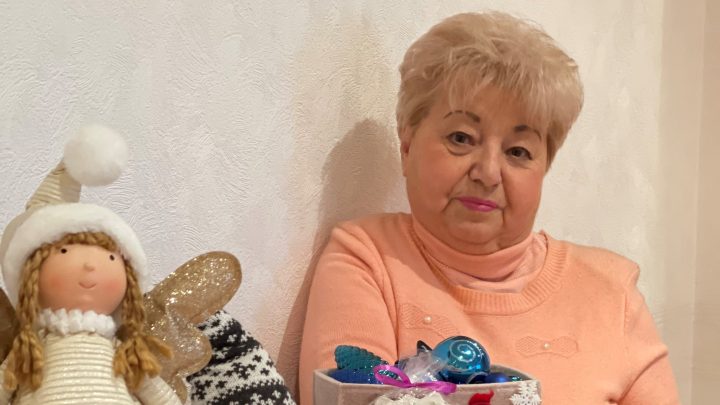
For Ukrainian refugee, free bus trips, SIM cards and places to live, courtesy the Polish people
For Ukrainian refugee, free bus trips, SIM cards and places to live, courtesy the Polish people


More than 3.9 million people have fled Ukraine since Russia began its invasion Feb. 24, according to the United Nations. Poland has taken the lion’s share — more than 2.3 million refugees. While the Polish government has authorized billions of dollars’ worth of assistance, many Polish people have used their own resources to help.
When the invasion began, 75-year-old Alla Mikhno was in bed.
“It was exactly 4 a.m. that I woke up to this horrific noise of sirens,” she recalled, her granddaughter Emiliia Komarova translating for her. “Five nights in a row when the sirens were going on, they were all running to metro because metro is now like a hiding place, like a bomb shelter. Every time I would run, the only thing on my mind was that I gotta keep running, I can’t let my heart stop — I’m an old person — I’ve got to make it.”
When not in the subway, Mikhno would sleep in her bathtub to hide from bombings. Komarova watched everything unfold on TV from Washington, D.C. Sometimes she would reach her grandmother on the phone, finding her sitting on the concrete floor of the subway station, surrounded by huddled families.
“She was telling me that when she saw families and their pets there and they were all supporting each other, and she was really crying on the phone because she was like, ‘Where is my family?’” Komarova recalled, tearing up herself. “She was all by herself, and only in moments like this you understand that you should have spent more time with her, you should have appreciated time with your grandma more, your parents and family in general.”

Across the border in Poland, Patryk Czerwony, Komarova’s old classmate from American University, was, like so many Poles, trying to find some way to help the streams of refugees from Ukraine.
“I texted every friend that came to mind, not even friend, but even people I didn’t really know well, and I offered the possibility to stay in our family house,” he said.
Komarova gladly accepted the offer. Her septuagenarian grandmother was then threading her way to the Polish border. A group of Ukrainians in Latvia had organized an evacuation bus, and her neighbors put her on it.
“You have 40 minutes to pack your stuff, and then we’re leaving,” they told her.
The bus spent 24 hours at the border but got through, and Czerwony was there with a car to take Mikhno to his family home in Kanczuga, Poland. Mikhno’s daughter and son-in-law were there; they had been traveling when the war broke out and also found their way to Patryk’s house, where he tried to help them feel at home.
“Patryk … I can’t even mention everything he has done because he has done so much,” Mikhno said. “He took us to various stores, he showed specific places where you can get discounted food or free food specifically for Ukrainians who don’t have money with them or who have low budget because of everything.”
He took them to pizzerias, gave them a tour of a medieval castle, basically tried to distract them from the 24/7 news coverage of destruction back home. Czerwony was far from the only one in this small town trying to help — all kinds of people, including grocers and bus drivers, pitched in.
“When drivers see Ukrainian passports, nobody’s asking any questions, you know, so it’s free for Ukrainians,” Mikhno said.
Poland’s largest cities have said they’re near the limit of refugees they can absorb, and so people like Mikhno are finding themselves in small towns and border towns like Czerwony’s.
“It’s a very small town of 3,000 inhabitants, however it has turned into, each of these towns have turned into an area of welcoming refugees and offering everything people could to help and make people feel at home,” Czerwony said.

A kindergarten opened spots for Ukrainian kids, a cooking club made meals, people set up fundraisers. The Polish government has kicked in $1.7 billion for refugee assistance, offering financial aid to households that take in refugees and allowing Ukrainians to work for the next year and a half. At the border, Mikhno received a free SIM card for her phone, and there were donated clothes and toys. Ukrainians can get debit cards with an allowance each month and access to health care.
“I want people to understand that Polish people are incredibly, incredibly supportive, and they’re doing everything to make people’s sufferings easier,” Mikhno said.
Aside from that, Mikhno just wants to go home to a country not at war.
There’s a lot happening in the world. Through it all, Marketplace is here for you.
You rely on Marketplace to break down the world’s events and tell you how it affects you in a fact-based, approachable way. We rely on your financial support to keep making that possible.
Your donation today powers the independent journalism that you rely on. For just $5/month, you can help sustain Marketplace so we can keep reporting on the things that matter to you.












